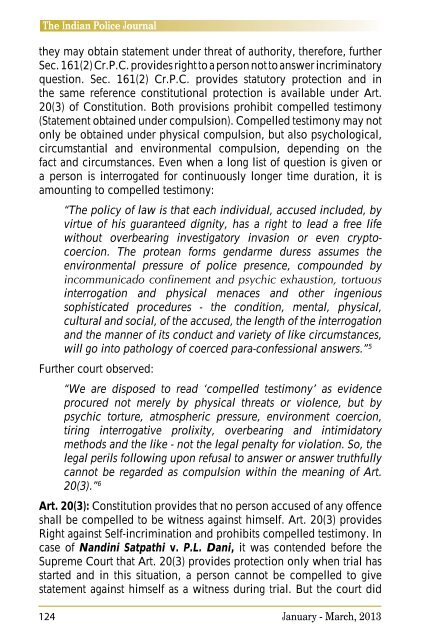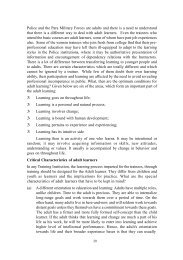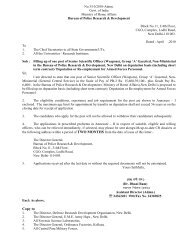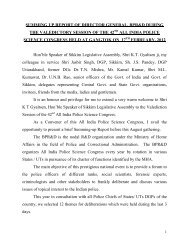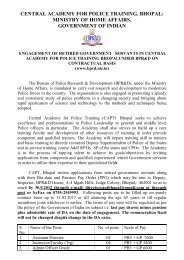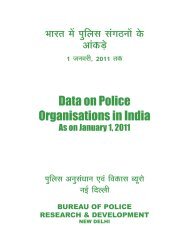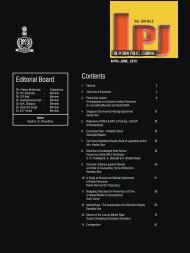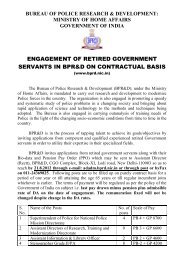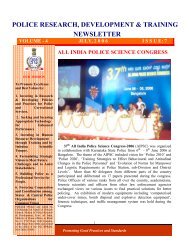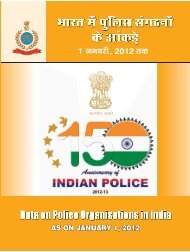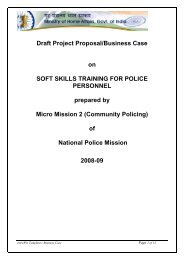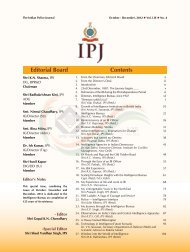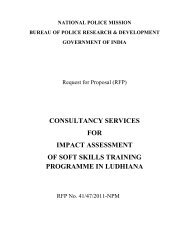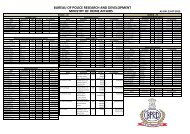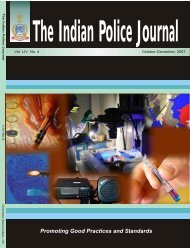by Police - Bureau of Police Research and Development
by Police - Bureau of Police Research and Development
by Police - Bureau of Police Research and Development
You also want an ePaper? Increase the reach of your titles
YUMPU automatically turns print PDFs into web optimized ePapers that Google loves.
The Indian <strong>Police</strong> Journalthey may obtain statement under threat <strong>of</strong> authority, therefore, furtherSec. 161(2) Cr.P.C. provides right to a person not to answer incriminatoryquestion. Sec. 161(2) Cr.P.C. provides statutory protection <strong>and</strong> inthe same reference constitutional protection is available under Art.20(3) <strong>of</strong> Constitution. Both provisions prohibit compelled testimony(Statement obtained under compulsion). Compelled testimony may notonly be obtained under physical compulsion, but also psychological,circumstantial <strong>and</strong> environmental compulsion, depending on thefact <strong>and</strong> circumstances. Even when a long list <strong>of</strong> question is given ora person is interrogated for continuously longer time duration, it isamounting to compelled testimony:“The policy <strong>of</strong> law is that each individual, accused included, <strong>by</strong>virtue <strong>of</strong> his guaranteed dignity, has a right to lead a free lifewithout overbearing investigatory invasion or even cryptocoercion.The protean forms gendarme duress assumes theenvironmental pressure <strong>of</strong> police presence, compounded <strong>by</strong>interrogation <strong>and</strong> physical menaces <strong>and</strong> other ingenioussophisticated procedures - the condition, mental, physical,cultural <strong>and</strong> social, <strong>of</strong> the accused, the length <strong>of</strong> the interrogation<strong>and</strong> the manner <strong>of</strong> its conduct <strong>and</strong> variety <strong>of</strong> like circumstances,will go into pathology <strong>of</strong> coerced para-confessional answers.” 5Further court observed:“We are disposed to read ‘compelled testimony’ as evidenceprocured not merely <strong>by</strong> physical threats or violence, but <strong>by</strong>psychic torture, atmospheric pressure, environment coercion,tiring interrogative prolixity, overbearing <strong>and</strong> intimidatorymethods <strong>and</strong> the like - not the legal penalty for violation. So, thelegal perils following upon refusal to answer or answer truthfullycannot be regarded as compulsion within the meaning <strong>of</strong> Art.20(3).” 6Art. 20(3): Constitution provides that no person accused <strong>of</strong> any <strong>of</strong>fenceshall be compelled to be witness against himself. Art. 20(3) providesRight against Self-incrimination <strong>and</strong> prohibits compelled testimony. Incase <strong>of</strong> N<strong>and</strong>ini Satpathi v. P.L. Dani, it was contended before theSupreme Court that Art. 20(3) provides protection only when trial hasstarted <strong>and</strong> in this situation, a person cannot be compelled to givestatement against himself as a witness during trial. But the court did124 January - March, 2013


